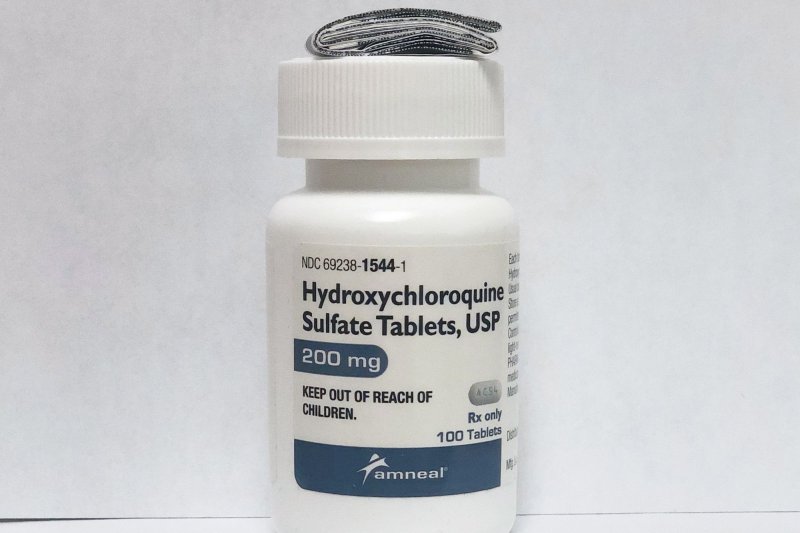Adding zinc to hydroxychloroquine and azithromycin may boosted the combinations effectiveness in COVID-19. File photo UPI |
License Photo
May 13 (UPI) -- Adding zinc to hydroxychloroquine and azithromycin might help the drug combination resolve some COVID-19 symptoms, a study posted online this week said, though experts say the two-drug treatment's benefit is questionable and carries health risks.
The findings breathe new life into a treatment regimen that has been touted by political and business leaders even before the results of clinical trials were in, experts said Wednesday.
Studies to date have indicated that the combination offers limited benefits at best, with potentially dangerous side effects.
"There is currently no highly effective agent for COVID-19 that we are aware of," Dr. Joseph O. Rahimian, an infectious disease specialist at New York University Langone Health and co-author of the zinc study, told UPI.
"It may end up that optimal treatment will include multiple agents and that zinc may be a part of a treatment 'cocktail,'" he said.
Historically, hydroxychloroquine has been used to treat malaria, while azithromycin is a commonly used antibiotic. Both have been studied in numerous clinical trials since the start of the outbreak of the new coronavirus, SARS-CoV-2.
To date, research has yielded mixed results. Last month, the U.S. Food and Drug Administration issued a warning about "life-threatening" side effects associated with hydroxychloroquine and advised that the drug only be used in hospitalized patients with COVID-19, the disease caused by SARS-CoV-2.
Still, with nearly 1.4 million Americans infected -- more than 180,000 in New York City alone -- researchers are desperate to find treatments.
For the study, which has not been published or peer-reviewed, Rahimian and his colleagues analyzed data from 932 people with COVID-19 treated at New York hospitals.
All of the patients enrolled received intravenous hydroxychloroquine -- an initial dose of 400 milligrams followed by twice daily 200-mg. doses for five days -- and 500 mg. of azithromycin once a day.
In addition, roughly 400 also received 100 mg. daily of zinc sulfate in the form of a supplement.
Taking more than 40 mg. per day of zinc, however, can cause significant side effects, including damage to joint cartilage, according to Xuhua Xia, a professor of biology at the University of Ottawa in Canada, who was not part of the study.
The authors found that patients given zinc were 1.5 times more likely to recover from the disease, reducing their need for intensive care and ventilation, compared to those who received hydroxychloroquine and azithromycin alone.
However, Rahimian emphasized that these findings need to be confirmed in a randomized, controlled trial, which is considered the gold standard for evaluating the safety and effectiveness of a treatment.
Zinc, available as an over-the-counter supplement, has long been viewed as an immune-system booster that helps in the development of immune cells -- or antibodies -- and strengthen the body's response to a virus or other pathogen, according to Adrian Gombart, a professor of biochemistry and biophysics at Oregon State University's Linus Pauling Institute. Gombart was not part of the NYU-led study.
How zinc bolsters hydroxychloroquine and azithromycin, though, isn't exactly clear. Rahimian told UPI that hydroxychloroquine acts as an "ionophore" -- essentially, a transporter -- that "helps get zinc into patients' immune cells."
"Nobody knows exactly how this combination works," Gombart said. "There is a suggestion that zinc may influence the replication of coronaviruses ... and that hydroxycholorquine might help zinc get into cells faster and slow virus replication."
Meanwhile, studies focusing on using hydroxychloroquine and azithromycin continue to produce less-than-promising results. One trial, published Monday by JAMA, found the combination wasn't significantly more effective than hydroxychloroquine alone, azithromycin alone or no drug therapy in patients with severe COVID-19.
The authors found that 26 percent of patients who received hydroxychloroquine plus azithromycin died from COVID-19 or from complications related to the drugs, compared to 13 percent among those who received neither drug.
In all, 20 percent of patients given hydroxychloroquine alone ultimately died, as did 10 percent of those receiving azithromycin alone.
"Patients were more likely to receive hydroxychloroquine, with or without azithromycin, if they had underlying risk factors for severe illness or more severe illness when they came to the hospital," study co-author Eli Rosenberg, an associate professor of epidemiology and biostatistics at the State University of New York at Albany, told UPI.
"After we statistically accounted for these initial differences, we did not observe a significant benefit of the administered drugs for lowering death in the hospital, but we did observe that hydroxychloroquine taken with azithromycin was associated with significantly elevated levels of cardiac arrest," he said.















